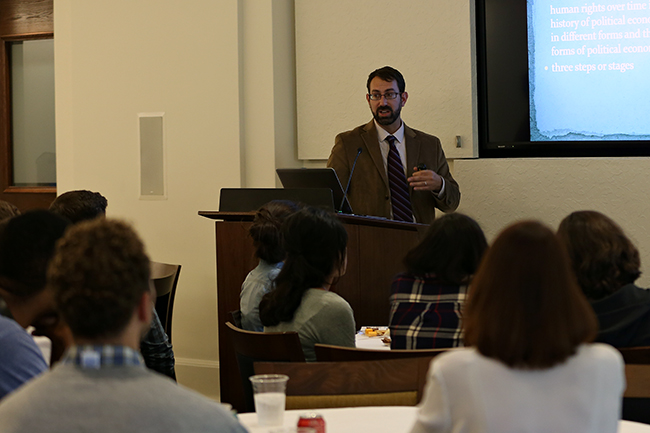UT students and professors gathered Monday afternoon for the Inequality and Human Rights seminar to discuss the existence of human rights in the age of inequality.
Samuel Moyn, guest speaker and Harvard law and history professor, started the panel by speaking about how the age of human rights and the age of inequality both exist simultaneously.
“The age of human rights really began in the 1940s,” Moyn said. “Before we think about the correlation of human rights and inequality, we must truly understand when it is that human rights began to develop.”
Moyn said people should understand the United Nation’s Universal Declaration of Human Rights’ commitment to socioeconomic status equality rather than distributive equality, which better ensures the equal rights of citizens outside their socioeconomic status.
“[The UN establishes] a normative floor of protection, however they have no concern about whether there should be a ceiling,” Moyn said. “The distance between the nonexistent ceiling and the floor represent the gap between the poorest and the wealthiest in society.”
Moyn said the relationship between human rights and inequality is both chronological and substantive.
“There is a substantive relationship between human rights and inequality, like normative individualism and critique of sovereignty,” Moyn said. “Human rights exist with inequality because human rights fail to view market fundamentalism as a problem.”
Moyn proposed a question at the beginning of the seminar which he would later answer: “Could human rights actually do something to combat economic inequality?”
“Human rights have never defended against inequality. Why would one think human rights movements should take up a concern which has been silent for the past sixty years?” Moyn said. “The human rights movement is not enough to create a new distribution of politics, at least not in any significant way.”
Willie Forbath, professor of law at UT, agreed with Moyn that human rights is not the most effective method of combating inequality.
“Human rights advocates are more constrained by the social movements they are working with,” Forbath said. “To maintain social equality, there must be a constant negotiation regarding the ceiling for the wealthy.”
Sean Doyle, first-year UT law student, said that although he disagrees with Moyn on the effectiveness of human rights, he believes Moyn was very persuasive.
“Moyn made a very persuasive argument to support his opinion that perhaps a human rights movement is not the best tool to combat inequality,” Doyle said.





















